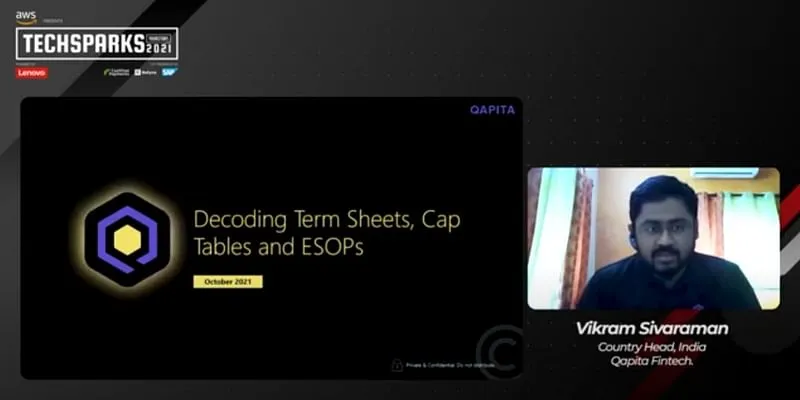ESOPs are a critical tool to drive entrepreneurial behaviour in employees, says Vikram Sivaraman of Qapita Fintech
Addressing a virtual audience on Day 2 of TechSparks 2021, Vikram Sivaraman, Country Head (India), Qapita Fintech, discussed the importance of term sheets, cap tables, and ESOPS.
With the startup economy booming in India, people are curious to understand how they can start their own company, which involves a lot of research about getting a high valuation for the company from investors, maintaining cap tables, and granting ESOPs once the business takes off.
While these terms can be confusing for some, during a masterclass at TechSparks 2021, Vikram Sivaraman decoded cap tables, ESOPs, and term sheets.
He gave tips on how founders can get a higher valuation for their respective companies from investors, investors’ rights, how ESOPs can be used to drive entrepreneurial behaviour, and more.
Term sheets and closing deals
Starting with term sheets, Vikram said the word evokes happy thoughts among most founders because it reminds them of a large funding round from a reputed investor. And, it is critical to look at term sheets in the context of the entire fundraising process.
“What’s critical for founders to understand here is that a term sheet is non-binding. It is issued based on what the investor has seen so far and whatever the investor appreciates in the business and the founders. It is subject to due diligence. The investor relies a lot on the representation, the facts, and figures put in front of them,” he said.

While most founders think the deal is done when they receive the term sheet, they must have the patience to carry the deal through to the end since formalities like due diligence and documentation require a lot of focus.
He explained investors look for a certain set of metrics, and it is important for founders to understand that. Adding that all founders must know their peers and competitors, Vikram said, conversations with peers will give them a fair idea about the terms offered by investors.
“It’s critical to understand what investors look for in terms of metrics. It is difficult and subjective to place a value on early-stage companies but founders need to understand that they must get to the proof-of-concept stage, demonstrate the product-market relationship, hit the market and show geographical expansion. For each of these stages, the risk perceived by the investor may decrease, and they might be willing to give you a high valuation” he added.
He added investors ask for certain rights — included in the term sheet or the definitive documentation — all of which imply founders, either commercially or in terms of obligations, are supposed to pay. He said these rights are of three types:
- Protection/Participation rights: Investors ask for certain rights like board representation, inspection rights, and information rights when they have over 20 percent stake in the company.
- Commercial rights: Investors ask for these rights to enhance the value of their investments, especially if they notice the company is doing well. This includes rights like pre-emptive rights, right of first refusal/offer, anti-dilution, and indemnity.
- Exit waterfall: Professional investors look to invest in a company to exit at some time. They lay down the manner and timeline of such exits known as an exit waterfall. This includes rights like qualified IPO, IPO, strategic sale, and company buyback.
Tracking stakes with cap tables is essential
Speaking about the various implications of a cap table, Vikram said founders should be careful about tracking their stakes.
He explained, “As they raise and dilute their funding, they may get to a point where their stake in the company is slightly low, wherein the next round of funding, the investors start questioning whether the company is more owned by investors and they are calling the shots.”
“So it’s critical for founders to understand what stakes they hold in the company and to see it doesn’t slip below a certain threshold,” he added.
Talking about other implications, Vikram said investors sometimes want to understand how much of the company is owned by employees under the ESOP pool.
In fact, looking at the cap table gives investors an idea of the actual numbers and class of securities they need to issue. He added a lot of focus falls on cap tables as part of the due diligence process followed by investors.
The art of granting ESOPs
Today, ESOPs are widely talked about in the startup ecosystem. They are securities provided to employees, which gives them an option to purchase the shares of the company at a certain price (known as an exercise price).
“ESOP is a critical tool for founders because it’s a tool to drive entrepreneurial behaviour. Employees start thinking of themselves as owners of the company and go the extra mile to ensure the company succeeds,” he said.
Talking about the benchmarks startups must follow while granting ESOPs, Vikram said they must determine the quantum and the eligibility of the employee. According to him, startups must take the pool size, employee CTC, discount to market salary, and exit value for the employee into account.
Noting that some companies prefer keeping a deep ESOP pool to cover a broad range of employees, Vikram said it is critical from the company’s perspective to communicate the value of ESOPs to its employees.
“ESOPs won’t have a lot of value if the employees don’t understand the wealth-creation and value-creation potential, and if they are not willing to take a long-term debt on you,” he concluded.
To log in to our virtual events platform and experience TechSparks 2021 with thousands of other startup-tech enthusiasts from around the world, join here. Don't forget to tag #TechSparks2021 when you share your experience, learnings and favourite moments from TechSparks 2021.
For a line-up of all the action-packed sessions at YourStory's flagship startup-tech conference, check out TechSparks 2021 website.

Edited by Suman Singh







